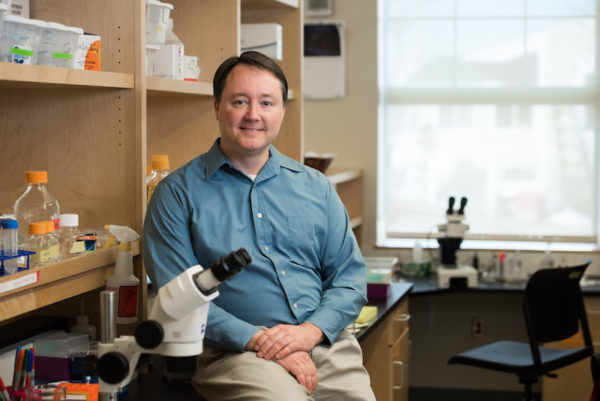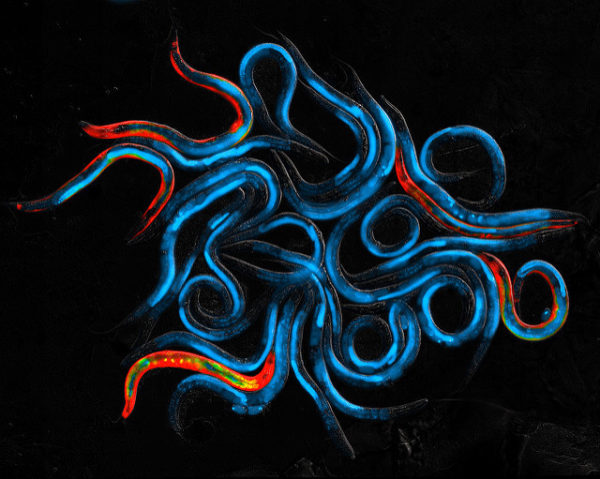Who would like to live forever? I don’t want to, but I would like to reach the ripe old age of 100 — healthy and with all systems intact!
I recently met a scientist who gave me some food for thought on the subject. Sorry about the cliché, but honestly, he did. His name is Dr. Aric Rogers. He’s doing longevity research at the MDI Biological Laboratory in Bar Harbor and 2017, received a $455,000 grant from the National Institute on Aging. It allowed him to continue studying the mechanisms in cells that govern longevity.
The research
Scientists have known for years that by dramatically reducing calories laboratory animals can live longer and delay or reduce the risk of many age-related diseases. Dr. Rogers discovered that when the diet is restricted, a regulatory mechanism called nonsense-medicated decay or NMD, which helps get rid of aberrant or “miscoded” genetic messages, also plays a critical role in extending life.
He conducted his research on a microscopic roundworm called C. elegans, which shares about half its genes with humans. If you feed roundworms bacteria (what they normally eat) that contain some genetic material you can knock down or reduce the function of any gene you want. Being able to do that elicits useful information. “We can see what a gene’s role is in growth and development, in longevity, or in mediating other aspects of health, say in disease models,” explained Dr. Rogers.
He saw that when you restrict the roundworms’ diet, you also restrict and redirect NMD, and it extends their life. “The takeaway,” he said, “is that the NMD pathway is a requirement for the increase in longevity that occurs with [dietary restriction]; if it doesn’t work properly, lifespan extension is forfeited.”
Diet and longevity
I’ll tell you why this finding is important but first, let me give you a simple explanation of how restricting the diet can prolong life in many species, including roundworms and humans. We all carry genes that are critical to our growth and development. But when we get past 40, they don’t need to be as active as they once were. In fact, it can be detrimental if they keep up the pace. “You can envision that maybe even something like cancer,” said Dr. Rogers, “which is sort of this unrestrained cellular growth, could happen if those growth-promoting programs aren’t properly kept in check.”
Every time we eat we send a signal to our cells that they need to keep on growing. “If you’re eating very rich, energy-dense food all the time,” said Dr. Rogers, “from the body’s point of view, you’re basically saying, ‘Oh, this is a good time for growth.'”
If your body is done growing, all that excess food produces excess energy. It can’t be used, so it gets stored as visceral fat. Fat that can lead to a host of health problems and a shortened lifespan.
On the other hand, if you drastically restrict what you eat (not to the point of malnutrition), it sends the body a different message — that nutrients are in low supply. There are no extra calories to store, so the cells adapt to this new situation. “The strategy that nature has for those times,” Dr. Rogers said, “is to divert energy away from growth and focus on maintaining the cells in the tissues that are there. So when you do something like dietary restrictions you’re creating an energy fueled stress inside your body — there are fewer nutrients, so the cells need to work more efficiently. Those are the signals you want to send to your cells. To be more efficient.”
Identifying a different way
The most common way people restrict their diets is they limit calories by fasting. There are lots of different types of fasts, some more or less drastic than others. To learn a bit more about fasting and its connection to longevity here’s an article about Dr. Valter Longo, He is director of the Longevity Institute at the University of Southern California.
The work that Dr. Rogers is doing in Maine is a big step toward finding a way other than fasting to help people live longer (and healthier) lives. “My goal is to identify and understand cellular functions that can then be used as new targets for therapeutic drug development,” he said.
The pharmaceutical industry is already trying to develop drug therapies that will manipulate NMD in the treatment of genetic disorders such as cystic fibrosis and hemophilia. It’s possible that these drugs could be repurposed to also work on longevity. Dr. Rogers said it’s also possible that these discoveries will lead to interventions that may prevent or delay age-related diseases like Alzheimer’s and Parkinson’s.
Understanding the connection between environmental factors, such as the food we put in our bodies and how it affects our health and longevity is hugely important says Dr. Rogers. The amount and type of food we eat is only one part of the picture.
“We are telling ourselves a story every time we eat, by how much sleep we get, whether we exercise. We’re communicating at a cellular level with our own tissues. We now understand that we’re actually changing the activity of our genes by our own actions. It’s important to keep that in mind.”
For more information about Dr. Rogers and his research visit the MDI Biological Laboratory website. You’ll also learn about some of the other work and scientific research that’s being done there.



Leave A Comment